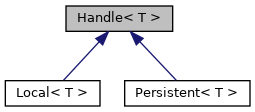 |
v8
3.14.5 (node 0.10.48)
V8 is Google's open source JavaScript engine
|
 |
v8
3.14.5 (node 0.10.48)
V8 is Google's open source JavaScript engine
|
#include <v8.h>

Public Member Functions | |
| Handle () | |
| Handle (T *val) | |
| template<class S > | |
| Handle (Handle< S > that) | |
| bool | IsEmpty () const |
| void | Clear () |
| T * | operator-> () const |
| T * | operator* () const |
| template<class S > | |
| bool | operator== (Handle< S > that) const |
| template<class S > | |
| bool | operator!= (Handle< S > that) const |
| template<class S > | |
| Handle< S > | As () |
Static Public Member Functions | |
| template<class S > | |
| static Handle< T > | Cast (Handle< S > that) |
An object reference managed by the v8 garbage collector.
All objects returned from v8 have to be tracked by the garbage collector so that it knows that the objects are still alive. Also, because the garbage collector may move objects, it is unsafe to point directly to an object. Instead, all objects are stored in handles which are known by the garbage collector and updated whenever an object moves. Handles should always be passed by value (except in cases like out-parameters) and they should never be allocated on the heap.
There are two types of handles: local and persistent handles. Local handles are light-weight and transient and typically used in local operations. They are managed by HandleScopes. Persistent handles can be used when storing objects across several independent operations and have to be explicitly deallocated when they're no longer used.
It is safe to extract the object stored in the handle by dereferencing the handle (for instance, to extract the Object* from a Handle<Object>); the value will still be governed by a handle behind the scenes and the same rules apply to these values as to their handles.
|
inline |
Creates an empty handle.
Definition at line 179 of file v8.h.
Referenced by Extension::GetNativeFunction().
|
inlineexplicit |
Creates a new handle for the specified value.
Definition at line 184 of file v8.h.
Referenced by v8::False(), v8::Null(), v8::True(), and v8::Undefined().
Creates a handle for the contents of the specified handle. This constructor allows you to pass handles as arguments by value and to assign between handles. However, if you try to assign between incompatible handles, for instance from a Handle<String> to a Handle<Number> it will cause a compile-time error. Assigning between compatible handles, for instance assigning a Handle<String> to a variable declared as Handle<Value>, is legal because String is a subclass of Value.
This check fails when trying to convert between incompatible handles. For example, converting from a Handle<String> to a Handle<Number>.
|
inline |
Definition at line 253 of file v8.h.
References V8::Handle.
Definition at line 244 of file v8.h.
References V8::Handle.
|
inline |
|
inline |
Returns true if the handle is empty.
Definition at line 209 of file v8.h.
Referenced by Object::GetInternalField().
|
inline |
|
inline |
Definition at line 218 of file v8.h.
Referenced by Arguments::operator[]().
|
inline |
Definition at line 216 of file v8.h.
Referenced by Context::Scope::Scope(), and Context::Scope::~Scope().
|
inline |